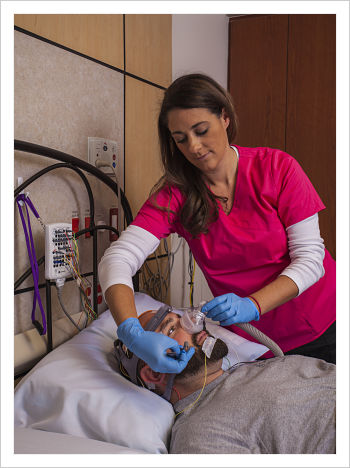
Sleep Disorders Laboratory
The Sleep Disorders Laboratory diagnoses and treats potentially serious sleep disorders, such as sleep apnea, excessive snoring, narcolepsy, restless leg syndrome and periodic limb movement disorder.
Brian M. Legere, MD, board-certified pulmonologist, serves as the medical director for the Sleep Disorders Laboratory, giving Dosher the opportunity to improve patient access and expand the hospital's preventative commitment to include sleep diagnostics.
Sleep disorders affect as many as 10 percent of adults in America. Left untreated, many serious conditions, such as sleep apnea, may have life-threatening consequences due to the toll taken on the cardiovascular and neurological systems. Research indicates that approximately 4-6 percent of the population suffers from sleep apnea, the most prevalent of all sleep disorders.
Patient profile
The profile of the typical apnea patient is an overweight, middle-aged or older adult, who snores loudly, and complains of being tired during the day. Those with sleep apnea will usually have the following symptoms: excessive daytime sleepiness; stentorian (loud) snoring; gasping or choking awakenings; awakenings for uncertain reasons; restless sleep; non-refreshing sleep; poor memory; poor intellectual function; irritability; personality changes; morning headaches; and confusion. Bed partners and house mates will frequently describe loud snoring with intermittent silent periods terminated by loud, or resuscitive snorting. Those with the condition may be unaware of their sleep pattern, but are aware that they wake up each day unrefreshed and, many times, irritable.People who suspect they may have a sleep disorder should bring their problem to the attention of their family physician or make an appointment for a consultation with Dr. Legere by calling 910-343-3345.
During the sleep consultation, Dr. Legere will obtain a general medical history and sleep history, plus conduct a physical examination. He will then determine if an overnight sleep study and additional tests are needed to conclusively diagnose the problem. If a sleep study is needed, he will schedule the study, review the sleep study results, and begin the patient on an appropriate treatment plan.
Sleep studies
The overnight sleep studies are conducted by highly trained sleep technologists while patients enjoy the comfort of private sleep rooms. The technologist greets patients when they arrive in the evening, educates them on what will occur, and begins their set-up for monitoring. Dosher's Sleep Disorder Laboratory contains two private, comfortable suites which are located within the Patient Care Unit at the hospital.Set-up involves the placement of various electrodes on the surface of the patient's scalp, face, chest, and lower leg to monitor brain waves, eye movements, respiration, heart rate and muscle activity. There are no injections, drugs, or x-rays associated with this procedure-and no pain associated with the placing or wearing of electrodes. A second night at the laboratory may be required for patients diagnosed with sleep apnea.
Treatments
Treatments can range from airway pressure appliances, medication, lifestyle changes, weight loss, ENT surgery and laser therapy, dental appliances, light therapy, and internal body clock adjustments. The treatment or treatments recommended depend upon the type of sleep disorder diagnosed.For more information on sleep studies at Dosher, call our clinical partner, SleepMed, at 866-937-6692, or our Director of Cardiopulmonary Services, John Watkins, at 910-457-3890.













